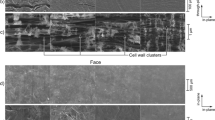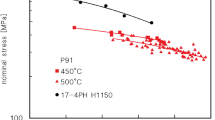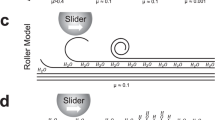Abstract
Davidson and Losty1 have proposed a logarithmic equation to describe the creep behaviour of synthetic graphites in the temperature-range 1,300–2,000° C. Analysis of results obtained at this laboratory by Martens, Jaffe and Button2,3 indicates that this equation also gives a good description of graphite creep at higher temperatures, up to 3,000° C. However, there are appreciable differences in the relation of creep to temperature and stress in the two temperature ranges.
This is a preview of subscription content, access via your institution
Access options
Subscribe to this journal
Receive 51 print issues and online access
$199.00 per year
only $3.90 per issue
Buy this article
- Purchase on Springer Link
- Instant access to full article PDF
Prices may be subject to local taxes which are calculated during checkout
Similar content being viewed by others
References
Davidson, H. W., and Losty, H. H. W., Nature, 181, 1057 (1958); “Mechanical Properties of Non-Metallic Brittle Materials”, edit. by Walton, W. H., 219 (Butterworths Scientific Publications, London, 1958).
Martens, H. E., Jaffe, L. D., and Button, D. D., Progress Rep. 20–373, Jet Propulsion Lab., Calif. Inst. Tech., Trans. Amer. Inst. Mech. Eng. (in the press).
Martens, H. E., Button, D. D., Fischbach, D. B., and Jaffe, L. D., Progress Rep. 30–18, Jet Propulsion Lab., Calif. Inst. Tech.; in Proc. Fourth Conf. on Carbon (Pergamon Press, London) (in the press).
Author information
Authors and Affiliations
Rights and permissions
About this article
Cite this article
FISCHBACH, D. High-Temperature Creep of Graphite. Nature 186, 795–797 (1960). https://doi.org/10.1038/186795a0
Issue Date:
DOI: https://doi.org/10.1038/186795a0
Comments
By submitting a comment you agree to abide by our Terms and Community Guidelines. If you find something abusive or that does not comply with our terms or guidelines please flag it as inappropriate.



